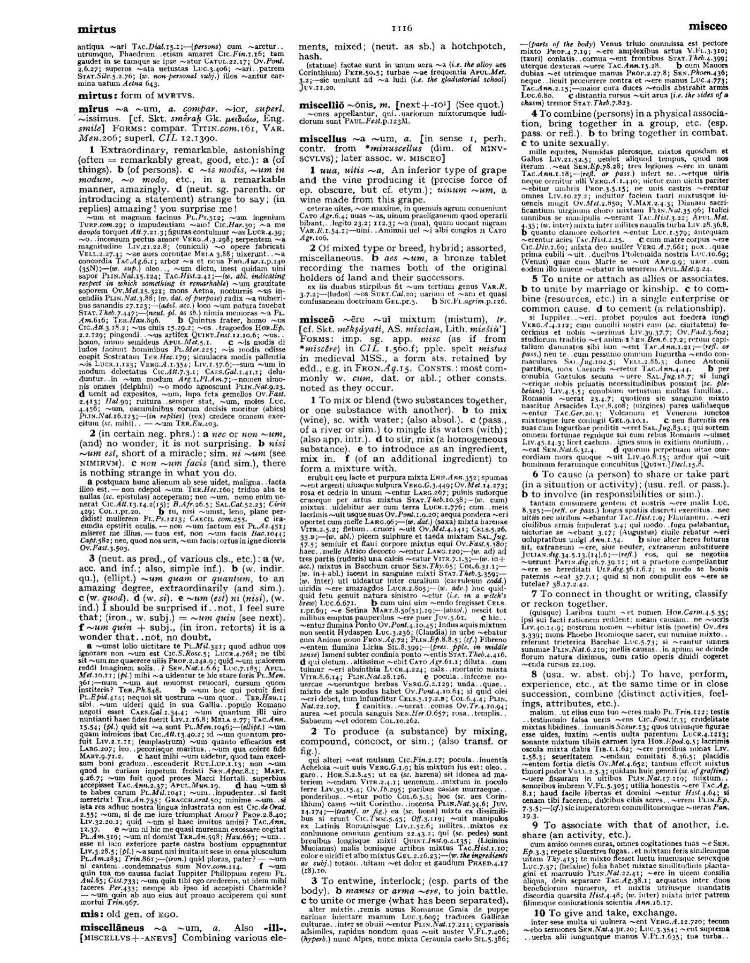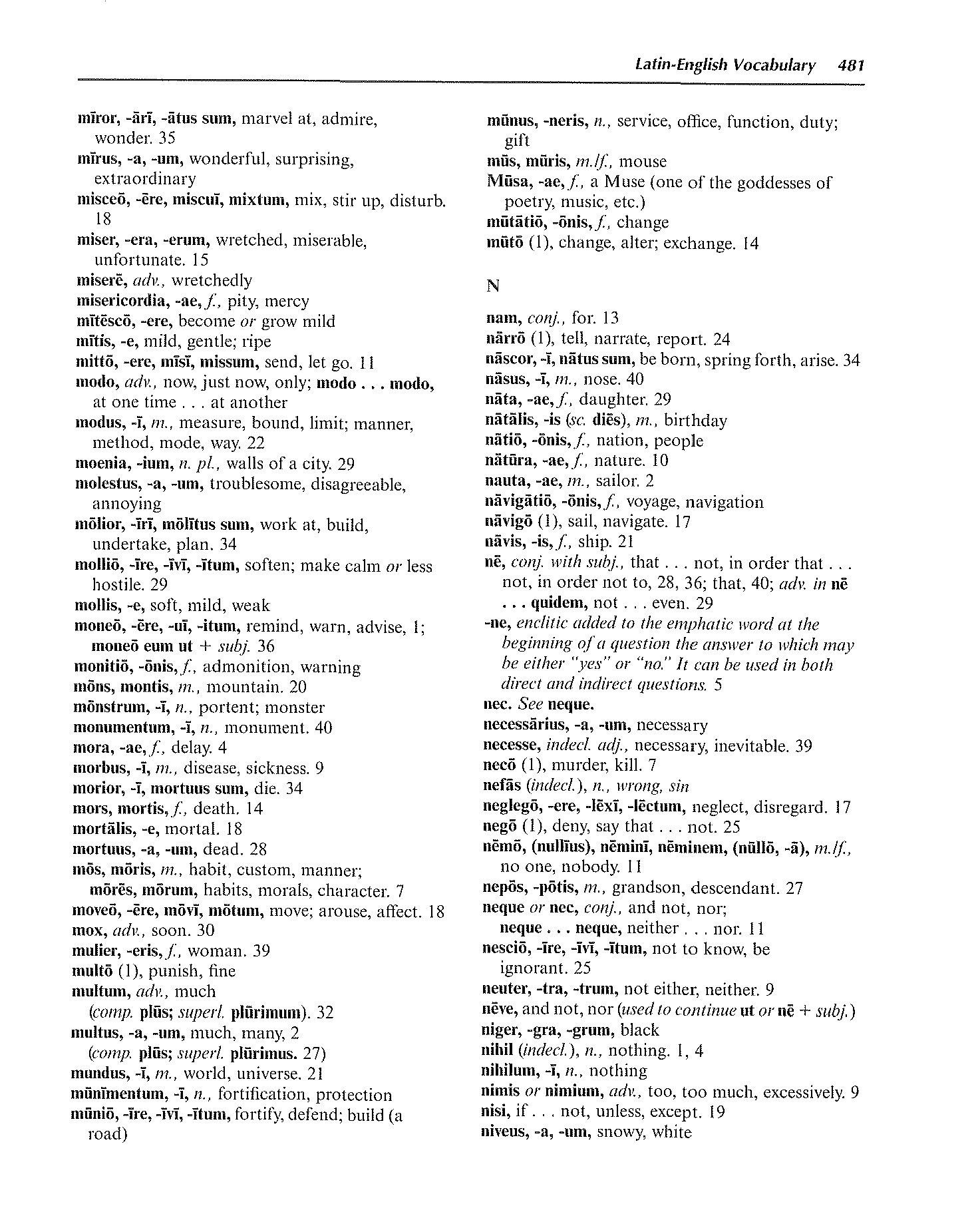
page_listing.tpl
page_subListingDetails.tpl
sub_listingDetails_style1.tpl
sub_listingDetails.title.tpl
mīrus extraordinary
mīrus is a Latin Adjective that primarily means extraordinary.
Definitions for mīrus
Wheelock's Latin
Adjective
- 1
wonderful, surprising, extraordinary
Oxford Latin Dictionary
Adjective
- 1
Extraordinary, remarkable, astonishing (often = remarkably great, good, etc.): (a) (of things). (b) (of persons). (c) ~is modis, ~um in modum, ~o modo, etc., in a remarkable manner, amazingly. (d) (neut. sg. parenth. or introducing a statement) strange to say; (in replies) amazing! you surprise me!
- 2
(in certain neg. phrs.): (a) nec or non ~um, (and) no wonder, it is not surprising. (b) nisi ~um est, short of a miracle; sim. ni ~um (see NIMIRVM). (c) non ~um facis (and sim.), there is nothing strange in what you do.
- 3
(neut. as pred., of various cls., etc.): (a) (w, acc. and inf.; also, simple inf.). (b) (w. indir. qu.), (ellipt.) ~um quam or quantum, to an amazing degree, extraordinarily (and sim). (c) (w. quod), (d) (w. si.). (e) ~um (est) ni (nisi), (w. ind.) I should be surprised if..not, I feel sure that; (iron., w. subj.) = ~um quin (see next). (f) ~um quin + subj., (in iron. retorts) it is a wonder that..not, no doubt.
Sentences with mīrus
Latin to English
Quid mirum, noscere mundum si possunt homines, quibus est et mundus in ipsis, exemplumque dei quisque est in imagine parva?Compare Who can wonder that the world is known so well by man, since himself is one? The same composure in his form is shewed, and man's the little image of the God.
Mirum videtur quod sit factum iam diu?Compare Does it seem marvelous because it was done long ago?
Data sources
Notes
- Definitions
- Frederick M. Wheelock, Wheelock's Latin, 6th ed., rev. Richard A. LaFleur (New York, NY: HarperCollins Publishers, 2005): 481.
- P. G. W. Glare, Oxford Latin Dictionary, Vols. 1-8 (Oxford: Clarendon Press, 1982): 1116.
- Word frequencies
- Paul B. Diederich, The Frequency of Latin Words and Their Endings, PhD diss., (Columbia University, 1939).
Bibliography
Allen, Joseph H. Allen and Greenough's New Latin Grammar for Schools and Colleges: Founded on Comparative Grammar. Edited by James B. Greenough, George L. Kittredge, Albert A. Howard, and Benjamin L. D'Ooge. Boston, MA: Ginn & Company, 1903.
Crystal, David. A Dictionary of Linguistics and Phonetics. 6th ed. Oxford, UK: Blackwell Publishing, 2008.
Delatte, Louis, Suzanne Govaerts, Joseph Denooz, and Etienne Evrard. Dictionnaire fréquentiel et index inverse de la langue latine [Frequency Dictionary and Inverse Index of the Latin Language]. Liège, Belgium: Laboratoire d'analyse statistique des langues anciennes de l'Université de Liège (L.A.S.L.A.), 1981.
Diederich, Paul B. The Frequency of Latin Words and Their Endings. PhD diss., Columbia University, 1939.
Francese, Christopher. "Latin Core Vocabulary." Dickinson College Commentaries. Last modified 2014. http://dcc.dickinson.edu/latin-vocabulary-list.
Gildersleeve, Basil L., and Gonzales Lodge. Gildersleeve's Latin Grammar: Third Edition, Revised, and Enlarged. 3rd ed. London, England: Macmillan and Co., 1903.
Glare, Peter G.W. Oxford Latin Dictionary. Vols. 1-8. Oxford, England: Clarendon Press, 1982.
Krüger, Bernd. "Latin Conjugation Tables." Cactus2000. Accessed May 5, 2023. https://latin.cactus2000.de/index.en.php.
Pierson, Nick. "Sound of Text." Accessed October 26, 2019. https://soundoftext.com.
Wheelock, Frederick M. Wheelock's Latin. 6th ed. Revised by Richard A. LaFleur. New York, NY: HarperCollins Publishers, 2005.
Wiktionary Contributors. "Victionarium." Wikimedia Foundation, Inc. Updated March 18, 2019. https://la.wiktionary.org/wiki/Victionarium:Pagina_prima.
Citation
Chicago (17th ed.)
Allo Contributors. "mīrus, mīra, mīrum (adj.) - Latin Word Definition." Allo Latin Dictionary. Last modified . Accessed February 20, 2026. http://ancientlanguages.org/latin/dictionary/mirus-mira-mirum.
Entry created on . Last updated on .







